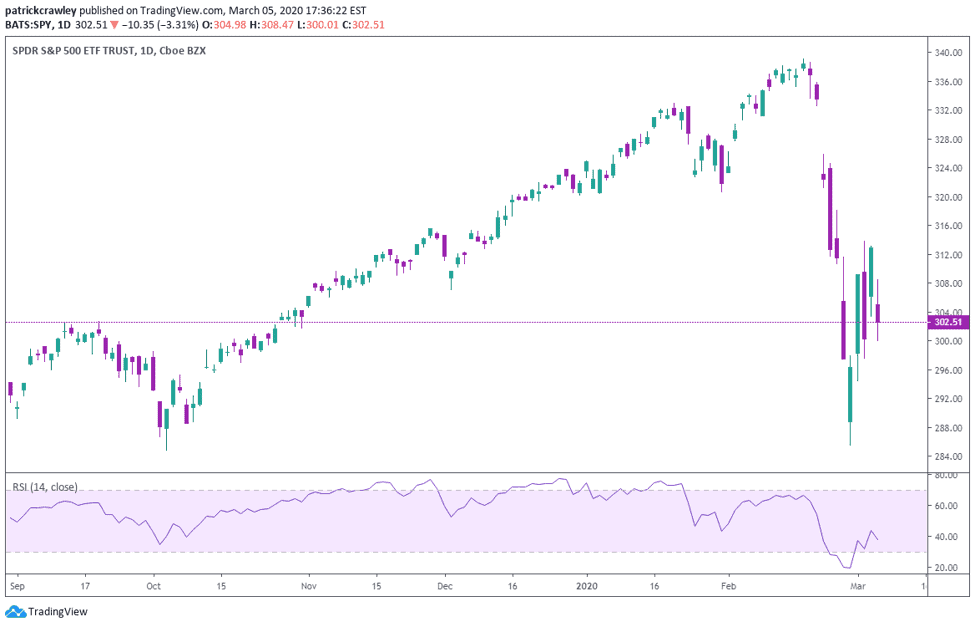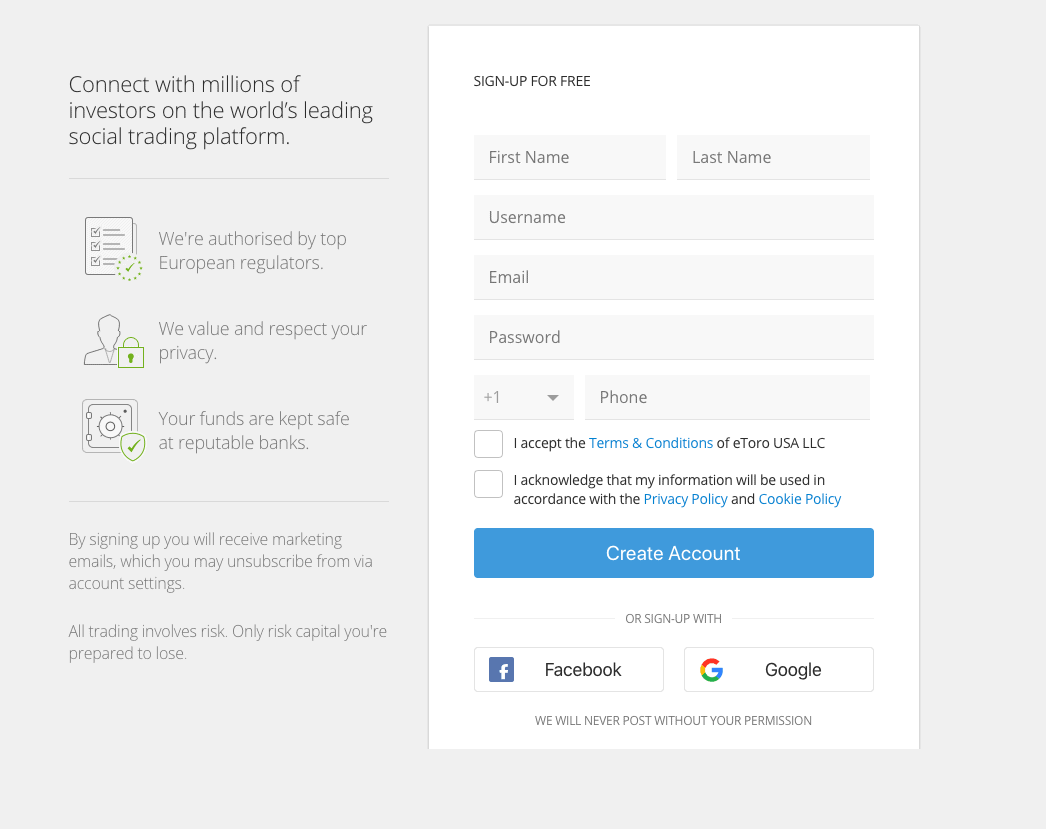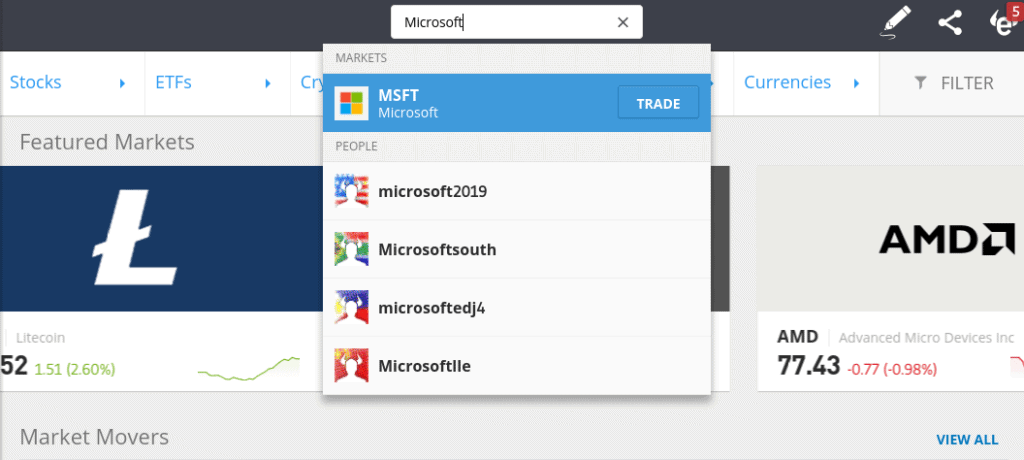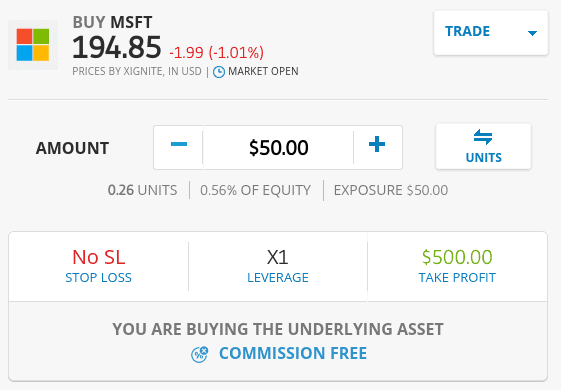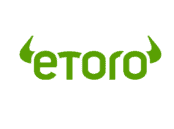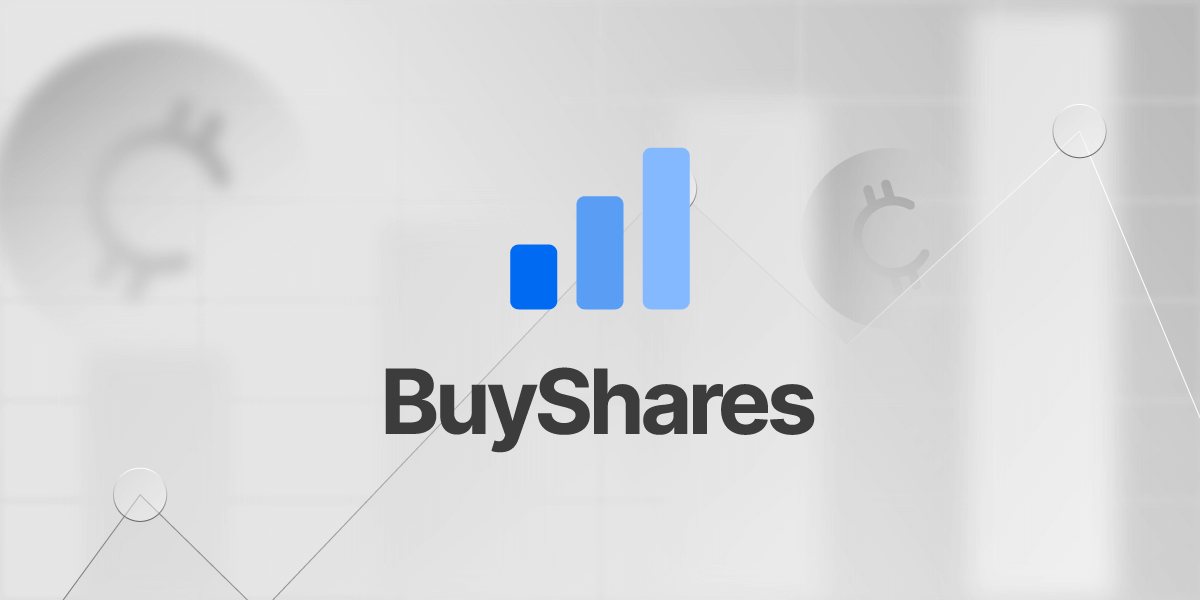Online Stock Trading South Africa Guide 2022 – How to Trade Stocks
Stock trading is the process of buying and selling shares online. Whether its companies listed on the JSE or larger markets like the NASDAQ or NYSE, the overarching objective is to make money.
You do this by correctly speculating on which way you think the stock price of the company will move in the short-run. Unlike traditional share investments, stock traders focus on small gains, but on a much more frequent basis.
In this guide, we cover everything there is to know about online stock trading in South Africa. We explain the ins and outs of how stock trading works, what risks you need to consider, which South African brokers are worth considering, and provide a step-by-step guide on how to trade stocks for beinners.
What is Stock Trading?

If you thought the opposite, you would place a ‘sell order’. This means that not only do you get to speculate on the stocks increasing in value, but also decreasing. This gives you much more flexibility in comparison to traditional share investments.
After all, when you buy shares in a company, you do so because you think they will go up in value. As we cover in more detail later on, it is important to note that stock trading in South Africa is suited to those of you that wish to trade actively.
That is to say, seasoned stock traders will often place dozens of buy and sell orders throughout the week. As a result, they will attempt to make small, but frequent profits. These profits can add up very quickly if you know how to trade stocks effectively. But, much like any investment sector, it can take a long time to master the required skills to succeed.
How Does Online Stock Trading Work?
No matter which stock market you decide to trade, share prices go up and down on a second-by-second basis. This makes it highly conducive as a trading arena, as there is always a profit-making opportunity in the making. In order to clear the mist, it’s probably best that we give you a couple of examples of how trading stock actually works before going any further.
Example 1: Going Long
When a stock trader goes long, this means that they think the underlying share price will increase in value. In order to put this prediction into a live position, the trader will place a buy order.
- Let’s suppose that you are trading Anglo American shares, which are listed on the JSE
- At the time of writing, the shares are priced at just over 41,000 ZAC
- You think the price will increase, so you place a buy order worth 33,000 rands
- A few hours later, Anglo American shares are priced at 45,100 ZAC (10% higher)
- On a stake of 33,000 rands, this represents a profit of 3,300 rands
- You want to lock-in your gains, so you close the position by placing a sell order
As you can see from the above, you made a profit of 3,330 rands. This is because you staked 33,000 rands, and the value of your order increased by 10%. This falls in-line with the share price of Anglo American, which also increased by 10%. Crucially, although you entered the trade with a buy order, you had to place a sell order to close it.
Example 2: Going Short
If going long means that you think the stock price will increase, then it makes sense that going short means the opposite. As a result, you are speculating on the stock price going down through a sell order.
- Let’s suppose that you want to trade Ford Motors shares, which are listed on the NYSE
- We’ll say that the shares are priced at $6.73
- You think the price will decrease, so you place a sell order worth $300
- A few hours later, Ford Motors shares are priced at $6.23 (7.42% lower)
- On a stake of $300 rands, this represents a profit of $22.26
- You want to lock-in your gains, so you close the position by placing a buy order
The above is a great example of how you can make gains even when the markets are down. Sure, Ford Motors shareholders won’t be happy that the stocks lost 7.42% in value. However, as a stock ‘trader’, you took full advantage of the situation by placing a sell order. In doing so, the 7.42% loss meant that you made 7.42% in gains!
Buying Stocks vs CFD Stock Trading

Then, if Apple stocks increase by 2.35%, as will the CFD instrument. The key point here is that CFDs allow you to trade assets such as stocks, indices, currencies, bonds, and cryptocurrencies in a super cost-effective manner. The reason for this is that the underlying asset does not exist.
It can take some time to get your head around the difference between ‘buying stocks’ and ‘CFD trading’, so let us elaborate further.
Did you know that ETFs can also be traded via CFDs? Nowadays you can buy and sell exchange-traded funds via the best ETF apps securely at low costs.
Ownership
First and foremost, when you buy stocks in the traditional sense, you actually own the asset. That is to say, if you buy 2% of all Amazon shares in circulation, you will own 2% of the company. This gives you certain stockholder rights, such as being able to vote in Annual General Meetings.
In the case of stock market trading through CFDs, you do not own the underlying shares. After all, the CFD instrument is simply tracking the real-world price of the asset.
Buy and Sell Positions
As we noted in our earlier examples, stock CFDs allow you to go long (buy order) and short (sell order) on your chosen shares. However, when you invest in shares, you can only go long. As a result, trading stock gives you much more in the way of flexibility.
Dividends
When you buy shares in the traditional sense, you will be entitled to dividends if and when the company makes a payment. There is often a misconception that CFDs do not afford you the same luxury. But, this couldn’t be further from the truth. With that said, it’s slightly more complex with CFD stocks, as it all depends on whether you are long or short on the shares.
- If you are long on the share CFD and the company distributes a dividend, you will be entitled to a payment. They are not paid by the company per-say, as you do not actually have a stake in the firm. Instead, the adjustment in your CFD trading account is paid for by those going short.
- As per the above, if you are short on a stock CFD that pays a dividend, there will be a negative adjustment in your account.
As you can see from the above, dividend adjustments are entirely possible in the CFD space. It’s just that the payment is covered by short-sellers as opposed to the respective company!
Leverage
An additional benefit of choosing stock trading over buying shares is that you will be able to apply leverage. In simple terms, this means that you will be able to trade with more money than you have in your account. This is expressed as a ratio, which is then multiplied by your stake.
For example:
- Let’s say that you are trading Facebook stock CFDs, which are priced at $250 per share
- You place a $3,000 buy order – meaning you think the price will increase
- You apply leverage of 1:10 on your order
- A few hours later, Facebook stocks increase by 2%
- Ordinarily, you would have made a profit of $60 ($3,000 stake x 2%)
- However, as you applied leverage of 1:10, you actually made a profit of $600 ($60 x 10)
As you can see from the above, leverage will amplify your profits by the ratio you took pre-trade. Of course, it can also do the same for your losses. As a South African, there are no regulations in place that limits the amount of leverage you can apply. So, this is determined by the broker. In some cases, you might be able to get leverage of up to 1:400. This means that a $100 balance would allow you to enter a position worth $40,000.
Stock Trading Markets
As we have noted, CFDs simply track the real-world price of a company’s stock. This means that in theory, if a market exists, then a CFD stock trade is possible. As a result, some South Africa brokers give you access to thousands of share CFDs.
To give you an idea of some of the most popular stock trading markets in South Africa, check out the below.
Johannesburg Stock Exchange
The Johannesburg Stock Exchange (JSE) is the primary stock market of South Africa. If you want to trade domestic companies, then you need to find a broker that gives you access to the JSE.
At the time of writing, the largest JSE stocks to trade are as follows:
- AB INBEV
- BATS
- NASPERS-N
- BHP
- GLENCORE
- ANGLO
- RICHEMONT
JSE stocks are more volatile in comparison to exchanges found in the US and UK, as market capitalizations and trading volumes are much lower.
London Stock Exchange
The London Stock Exchange (LSE) is the primary stock market of the UK. Some of the largest companies listed on exchange include:
- ASTRAZENECA
- BAT
- GLAXOSMITHKLINE
- BP
- RBS
- HSBC
- BT
Most online stock trading sites cover the LSE.
New York Stock Exchange
The New York Stock Exchange (NYSE) is the largest market in the world for trading shares. This means that you will never struggle for trading volume or liquidity. You will find companies such as:
- BERKSHIRE HATHAWAY
- ALIBABA GROUP
- J P MORGAN CHASE
- VISA INC
- JOHNSON & JOHNSON
- WALMART INC
- EXXON MOBIL
Virtually every stock trading platform in the online arena will give you access to the NYSE.
NASDAQ
The NASDAQ is a tech-orientated stock market. Based in New York, it is the second-largest stock exchange in the world. It also contains some of the most valuable stocks in the US trading scene, such as:
- AMAZON
- APPLE
- TESLA
- NETFLIX
- IBM
- MICROSOFT
Once again, irrespective of which stock trading site you choose to sign up with, it is all-but-certain that it supports the NASDAQ.
Online Stock Trading Fees
If you want to trade stocks from the comfort of your home, then you should expect to pay a fee of some sort. Some brokers have super-complex commission structures, while others are more straight forward. In order to clear the mist on what you should expect to pay, below we breakdown the main charges involved when stock trading online.
Commissions
When buying stocks in the traditional sense, you will always pay a share dealing charge. This is normally a flat fee. The main exception to this rule is eToro, which charges nothing to invest in stocks. Nevertheless, due to the cost-effectiveness of offering CFD markets, you can normally trade stocks without paying any commission. This means that you will only pay the spread.
However, it is important to note that some stock market trading sites in South Africa do charge a commission on CFDs. If they do, this is normally a variable commission. For example, if the broker charges a commission of 0.25% and the value of your buy position is $2,000, then you will pay a fee of $5. You would then pay 0.25% again when you exit the position.
To note, if you are looking for a commission-free stock trading site that is popular with South Africans, eToro is well worth considering. You can read our eToro review here.
Spreads
Even if you choose a commission-free share trading platform, you will still need to take the spread into account. This is the difference between the buy and sell price of the stock that you wish to trade. The gap in pricing is how the platform makes money irrespective of which way the markets go.
For example:
- The ‘real-world’ market price of Visa stocks is $170
- The sell price is $169.50
- The buy price is $170.50
So, if you were to place a buy order on Visa, you would get a price of $170.50. However, if you then wanted to sell your Visa stocks, you would only be able to do so at $169.50. In simple terms, you would need the sell price to increase from $169.50 to $170.50 just to break even.
As such, it’s crucial that you only choose South Africa stock trading platforms that offer low spreads.
Overnight Financing
Stock CFDs are leveraged financial products. This is the case even if you do not apply leverage, which is somewhat confusing. Nevertheless, if you keep your position open overnight, then you will need to pay additional fees.
This is known as overnight financing, and it is essentially interest charged by the broker for keeping the position live past market hours. This is why stock market trading is more suited for short-term positions, as the costs can quickly add up.
Penny Stock Trading in South Africa
Penny stocks are companies that have a small market capitalization. In the US, the term is used to describe a company with a stock value of less than $5. In the UK, it’s anything below £1. Either way, penny stocks are highly volatile, not least because they suffer from low liquidity levels and thin trading volumes.
On the one hand, this does make them ideal for short-term stock trading, as there are plenty of opportunities to make money. However, penny stocks can also lose you a lot of money in a very short period of time. This is why you are best advised to stick with large-cap stocks listed on major exchanges like the NASDAQ, NYSE, or LSE.
Stock Trading Apps
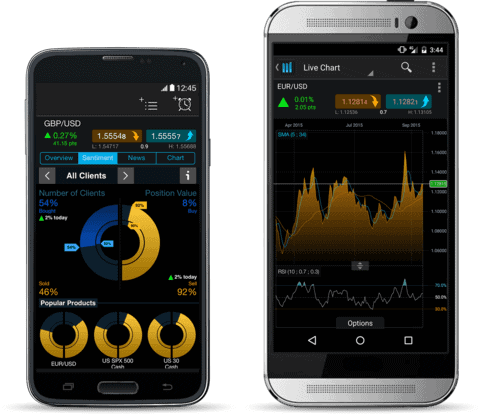
The benefits that this presents are as follows:
- You will never miss a last-minute trading opportunity again
- You can exit a losing position instantly if the stock is falling/rising rapidly
- You can keep tabs on your portfolio at the click of a button
- You can receive pricing alert notifications
- You can receive fundamental news stories direct to your phone
Don’t make the mistake of thinking that stock trading apps are cumbersome to use. On the contrary, they are designed specifically for your operating system (Android or iOS). This means that you will be accustomed to a top-notch trading experience when you are on the move.
In our opinion, eToro offers the best stock exchange trading app in South Africa, due to its user-friendly platform, 0% commission and a copy trading tool.
Stock Trading vs Forex
In a similar nature to stock trading, the forex markets are highly conducive for making small, but frequent gains. For those unaware, forex trading refers to the buying and selling of currencies. Much like shares, currency exchange rates change on a second-by-second basis. However, you can not trade currencies individually. On the contrary, you will be trading currency ‘pairs’.
For example:
- Let’s say that you wanted to trade the exchange rate between the US dollar and South African rand
- In forex terms, the pair would look like this: USD/ZAR
- We’ll say the exchange rate 16.98
- This means that for every 1 USD, you would get 16.98
Then, you would need to speculate whether you think the currency exchange rate will go up or down. If you think it will increase, you place a buy order. If you think the opposite, you place a sell order. As you can see, this works much the same way as trading stock.
There are a couple of minute differences, however. For example, while stocks only operate during market hours on a 24/5 basis, the forex scene is active 24/7. Furthermore, the forex markets trade are worth well over $5 trillion each and every day. This is significantly more than individual stock exchanges like the JSE.
Forex brokers like eToro also host stock CFDs, so you can facilitate all of your trading needs via one platform.
Stock Trading Strategies
In truth, the only way that you will be able to make consistent gains in the stock market trading scene is if you have a proven strategy in place. There are heaps of strategies utilized by seasoned traders, and no strategy is better than the next. It is all down to personal preference.
Below we discuss some of the most commonly used stock trading strategies opted for by South Africans.
Swing Trading
Swing trading gives you a lot of flexibility in the online stock trading arena. This is because you will be attempting to catch short-to-medium trends. As such, a swing trader might keep a position open for a matter of days. Alternatively, if the trend remains in play, they might keep their position open for several weeks.
With that said, rarely will the swing trader hold on to a stock CFD for more than a couple of months. Nevertheless, the overarching concept is to ‘follow the money’. For example, let’s say that Amazon stocks smash through their previous all-time highs.
A shrewd swing trader would keep their buy position open until it looks like the trend is about to reverse. Then, they might replace their long position with a short-sell order to catch the downward trend!
Day Trading
Day trading is essentially the opposite of swing trading. This is because – and as the name suggests, the trader will rarely keep a position open overnight. This ensures that they never pay any overnight financing fees on their stock trades. As you can imagine, the amount of price movement on a stock in a single day of trading is going to be somewhat minute.
As such, the profit margins targeted by day traders are much lower in comparison to swing traders. On the flip side, day traders will enter and exit a lot of positions throughout the trading week.
Buy and Hold
This particular strategy won’t be suitable for CFD stocks, not least because you will incur overnight financing fees for each day that you keep your position open. But, if you plan to buy shares in the traditional sense, then a buy and hold strategy is highly conducive. Put simply, you will be buying stocks and holding on to them for a number of years.
Along the way, you might receive dividend payments, and then re-invest them into other stocks. Crucially, a buy and hold strategy allows you to forget about your investment and ride out the ups and downs of stock market volatility. It also removes the need to actively perform daily research on your shares, as you are in it for the long run.
Best Stock Trading Platforms
So now that you know the ins and outs of what stock exchange trading entails, you now need to start thinking about which online broker you plan to use. There are heaps of stock trading sites that accept South Africans, so you have lots to choose from. The most important metrics that you need to look out for are:
- Is the online share trading site regulated?
- What shares can you trade?
- Will you by buying shares or trading stock CFDs?
- What fees and commissions does the broker charge?
- Does the platform offer suitable trading tools and features?
Taking the above into account, below you will find a selection of the best South African share trading platforms of 2022.
Note: All three of the stock trading sites listed below are heavily regulated. This includes at least two tier-one licenses from the likes of the FCA (UK), CySEC (Cyprus), and ASIC (Australia).
1. Capital.com – Best Stock Trading Platform for Small Stakes

Once again, it’s only the spread and overnight financing fees that come into play. We should, however, note that Capital.com offers some of the most competitive spreads in the space. It clearly displays what this amounts to before you trade, which is really useful.
A further reason why Capital.com is popular with South Africans is its low minimum deposit policy. At just $20, this allows you to access the stock trading arena without breaking the bank. Take note, if you deposit with a bank account, this increases to $250. As such, it’s best to consider a debit/credit card or e-wallet.
Capital.com is also likely to be of interest if you are a fan of mobile trading. This is because it offers a fully-fledged iOS/Android application that allows you to enter buy and sell positions on the move. Just like the other top-rated platforms we have discussed thus far, leverage faciliaites are available at Capital.com.
Cons:
- No social trading network
75.26% of retail investor accounts lose money when spread betting and/or trading CFDs with this provider.
2. eToro – Best All-Round Online Stock Trading Platform
eToro is a popular online trading platform that gives you the best of both worlds. This is because you can invest in shares in the traditional sense, or trade stock CFDs. The broker offers over 800 equities across 17 different exchanges, so you will be able to diversify with ease.
If you place a buy order on your chosen stock without leverage, then you will be purchasing the underlying shares. If you short-sell the stock or apply leverage, then you will be trading stock CFDs. Either way, the platform does not charge any commissions. The only direct trading fee that you need to look out for is overnight financing – which is for CFDs only.
The eToro trading platform is best suited for newbie investors, as it is super-simple to use. You don’t need any prior trading experience, nor do you need to understand how technical indicators work. Instead, you simply need to open an account, deposit some funds, and choose which shares you wish to trade. What we also like about eToro is that it allows you to trade from just $50 per order.
This is ideal if you want to practice stock trading with real money, but you don’t want to risk losing vast amounts. In terms of getting money into eToro, the platform accepts South African debit cards, credit cards, e-wallets, and a bank transfer. Account minimums start at $200, which is about 3,400 rands.
Pros:
- Super user-friendly online stock broker
- Buy shares without paying any commission or share dealing charges
- 800+ shares listed on 17 international markets
- Buy shares of trade CFDs
- Social and copy trading
- Mobile trading app
- Regulated by the FCA, CySEC, and ASIC
Cons:
- Not suitable for advanced traders that like to perform technical analysis
68% of retail investors lose money trading CFDs at this site
3. Plus500 – Commission-Free Stock CFD Platform
If you’re looking for a specialist CFD trading platform, look no further than Plus500. The provider offers thousands of tradable products – including over 2,000+ stock CFDs. This includes dozens of stock exchanges – such as the JSE. This means that you can enter buy and sell positions on your favourite South African companies.
If you want to access more liquid exchanges like the NASDAQ, NYSE, or LSE – Plus500 also has you covered. No matter what market you wish to trade at the platform, Plus500 does not charge any trading commissions. As such, it’s only the spread and overnight financing fees that you need to consider. Outside of the stock CFD department, you can also trade indices, cryptocurrencies, forex, commodities, and more.
The CFD provider does not offer any third-party trading platforms like MT4. Instead, everything is facilitated via the Plus500 website or mobile app. Getting started takes minutes, and minimum deposits amount to just £100 (about 2,200 rands). You can fund your account with a debit/credit card, bank account, or e-wallet.
Plus500AU Pty Ltd holds AFSL #417727 issued by ASIC, FSP No. 486026 issued by the FMA in New Zealand, and Authorised Financial Services Provider #47546 issued by the FSCA in South Africa.
Pros:
- Commission-free CFD platform – only pay the spread
- Thousands of financial instruments across heaps of markets
- Leverage of up to 1:30
- Ability to enter buy and sell positions
- Takes just minutes to open an account and deposit funds
Cons:
- CFDs only
- Only suitable for experienced traders
How to Trade Stocks for Beginners on eToro
So now that you have a selection of top-rated South African stock trading platforms to choose from, we are now going to show you how to get started with an account today. The guidelines below are based on popular stock broker eToro, although you can use any platform of your choosing.
Open an Account
Before you can trade stocks at eToro, you will need to open an account. Simply head over to the provider’s homepage and click on the ‘Create Account’ button.
You will need to:
- Enter your personal information
- Create a username and password
- Answer some basic questions about your historical trading experience
Upload Some ID
All eToro traders are required to upload verification documents. This ensures that the broker remains compliant with its licensing bodies.
As such, upload a copy of your:
- South African passport or driver’s license
- Bank account statement or utility bill
Deposit Funds
You will now be asked to make a deposit. As noted earlier, minimum deposits start at $200.
You can fund your account with:
- Debit Card
- Credit Card
- Paypal
- Skrill
- Neteller
- South African Bank Account
All of the above deposit methods are instant, apart from a bank account transfer. All deposits come with a conversion fee of 0.5%.
Trade Stocks
You are now ready to place your first-ever stock trade. To get the ball rolling, enter the name of the company that you wish to trade into the search box. In our example, we are looking to trade Microsoft stocks.
Upon clicking on the result that loads up, click on the ‘Trade’ button.
You will then see an order box for your chosen stock. Select from a buy or sell order, and then enter the amount that you wish to stake on the trade. You can also apply leverage, if you wish.
Finally, click on the ‘Open Trade’ button. Your stock trade will then remain active until you actively close it. Alternatively, you can set up a stop-loss and take-profit order to close the trade automatically when the respective price is triggered.
Conclusion
In summary, stock trading in South Africa is a great alternative to traditional share investing if you plan to trade actively. That is to say, instead of simply buying shares and holding on to them for several years, you will placing entry and exit positions throughout the trading week. As such, you will be looking to target smaller margins, but on a much more frequent basis.
With that said, you need to ensure you choose a stock trading platform that allows you to achieve these goals, and we think there’s no better broker than South Africa than eToro, due to its 0% commission, great range of stocks, and innovative copy trading tools.
Like the sound of eToro? Simply click the link below to register an account today!
eToro – Trade Stocks with Zero Commission
68% of retail investor accounts lose money when trading CFDs with this provider.

